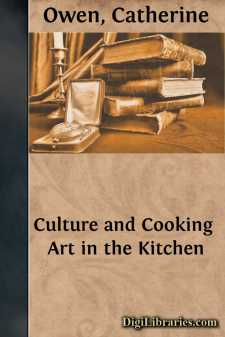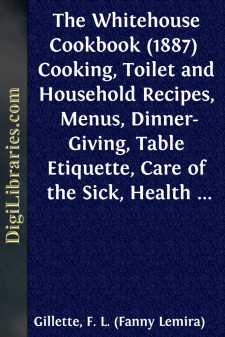Cooking
- General
- History 1
- Reference 10
- Regional & Ethnic 3
- Vegetarian 10
General Books
Sort by:
by:
Various
MY PET RECIPES TRIED and TRUE CONTRIBUTED BY THE LADIES AND FRIENDSOF ST. ANDREW'S CHURCHQUEBEC "We may live without poetry, music and art; We may live without conscience, and live without heart; We may live without friends; we may live without books; But civilized man cannot live without cooks."—Owen Meredith. QUEBEC "DAILY TELEGRAPH" PRINTING HOUSE 1900 Rhymes to Remember......
more...
INTRODUCTORY CHAPTER The true economy of housekeeping is simply the art of gathering up all the fragments, so that nothing be lost. I mean fragments of time, as well as materials. Nothing should be thrown away so long as it is possible to make any use of it, however trifling that use may be; and whatever be the size of a family, every member should be employed either in earning or saving money....
more...
by:
Mary Hooper
PREFACE. In presenting our friends and the public with the thirteenth edition of our "Home Comforts," we have the pleasure to remark that so greatly has the book been appreciated, that the large number of FIVE HUNDRED THOUSAND copies has been called for. The value of the Jubilee Edition was enhanced by some new recipes; these are repeated in the present edition, to which, also, some valuable...
more...
by:
Mary Randolph
SOUPS ASPARAGUS SOUP. Take four large bunches of asparagus, scrape it nicely, cut off one inch of the tops, and lay them in water, chop the stalks and put them on the fire with a piece of bacon, a large onion cut up, and pepper and salt; add two quarts of water, boil them till the stalks are quite soft, then pulp them through a sieve, and strain the water to it, which must be put back in the pot; put...
more...
by:
Catherine Owen
a few preliminary remarks Alexandre Dumas, père, after writing five hundred novels, says, "I wish to close my literary career with a book on cooking." And in the hundred pages or so of preface—or perhaps overture would be the better word, since in it a group of literary men, while contributing recondite recipes, flourish trumpets in every key—to his huge volume he says, "I wish to be...
more...
GENERAL DIRECTIONS. The following directions may appear trite and common, but it is of the greatest consequence that they be strictly observed: Attend to minute cleanliness. Never wipe a dish, bowl, or pan, with a half dirty napkin, or give the vessel a mere rinse in water and think that it is then fit for use. See that it be dried and pure from all smell before you put in any ingredient. Never use the...
more...
CARVING. Carving is one important acquisition in the routine of daily living, and all should try to attain a knowledge or ability to do it well, and withal gracefully. When carving use a chair slightly higher than the ordinary size, as it gives a better purchase on the meat, and appears more graceful than when standing, as is often quite necessary when carving a turkey, or a very large joint. More...
more...
INTRODUCTION The word "fat" is one of the most interesting in food chemistry. It is the great energy producer. John C. Olsen, A.M., Ph.D., in his book, "Pure Food," states that fats furnish half the total energy obtained by human beings from their food. The three primary, solid cooking fats today are: There are numbers of substitutes for these, such as butterine, oleomargarine and...
more...
by:
Elizabeth Moxon
ENGLISH HOUSEWIFRY. 1. To make VERMICELLY SOOP. Take a neck of beef, or any other piece; cut off some slices, and fry them with butter 'till they are very brown; wash your pan out every time with a little of the gravy; you may broil a few slices of the beef upon a grid-iron: put all together into a pot, with a large onion, a little salt, and a little whole pepper; let it stew 'till the meat...
more...
CHAPTER I. Soups. STOCK OR CONSOMMÉ. This is the basis of all kinds of soup and sauces. Shin of beef or ox-cheek make excellent stock, although good gravy-beef is sometimes preferred; the bones should always be broken, and the meat cut up, as the juices are better extracted; it is advisable to put on, at first, but very little water, and to add more when the first quantity is nearly dried up. The time...
more...











